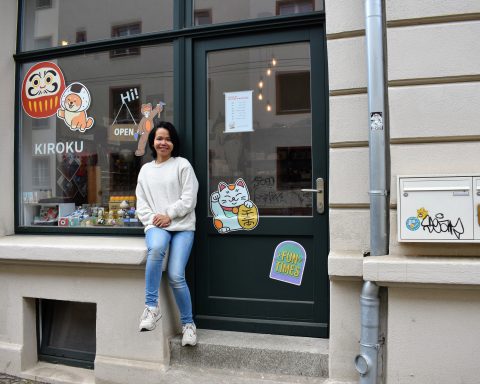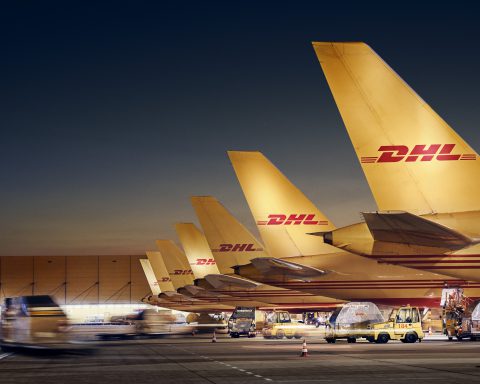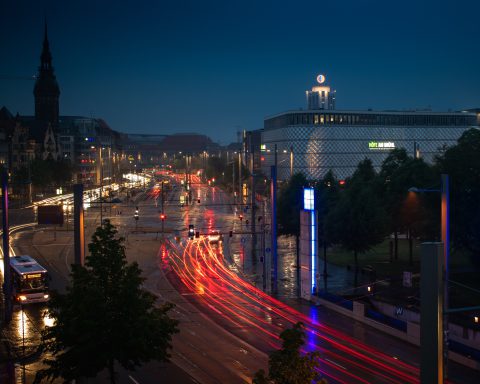If you ever held a German book printed before 1945, chances are it was printed in Leipzig. Leipzig once possessed a quasi-monopoly on book printing. All major publishers had their headquarters in our city.
The annual book fair, the peculiar shape of Leipzig’s highest building, and most importantly, the presence of the German National Library (which contains a copy of every book ever printed by a German publisher), are mementos of Leipzig’s former grandeur.

In part, this period continues to echo in our everyday lives through a wide selection of small bookstores in the Leipzig area. Yet booksellers don’t have it easy.
E-books and Amazon have transformed the way we read. With a bit of an effort and a good search engine, you can find pretty much any novel online for free.
And if we fancy physical books, we can order anything off Amazon and have it delivered to our door the next day.
Why would we buy our books in small shops, and why haven’t these shops long succumbed to giants like Amazon? I spoke to two booksellers in Schleußig about their businesses.

“I read around 100 novels every year,” says Hans Kohlmann, the owner of Whodunnit, a small book shop on Könneritzstraße 67.
“People don’t just come in here to buy something and walk out again; they want to get informed recommendations.”
Sitting behind his desk, Hans is surrounded by huge piles of literature. As I wait for a chance to speak with him, several customers come in to place orders for books. He does a quick search on his computer, and promises that everything will be ready to be picked up the next day.
His bookstore is highly specialised, with a clear focus on criminal fiction. “I get customers from all over Germany because I’m listed in several tourist guides,” he says
And more than that. I buy all my books from Hans, including those in English. I usually just drop him an email, and most of the time he’s able to get them by the next day.
When I enter his shop, he’ll ask me about my daughter Katerina and we’ll have a quick chat about how hard it is to find the time to read when you have kids.
Speaking of kids, there is another bookstore in Schleußig, which specialises in, and you may have guessed it, children’s books. H24 opened only a year ago at Holbeinstraße 24.
Owner Martin Maslaton, a pretty renowned Leipzig-based lawyer, wanted to fulfill his life-long dream of having his own bookshop. It is probably Leipzig’s prettiest place to buy books.
The interior is decorated with beautifully renovated tables and bookshelves from the early 20th century.
“Prof Maslaton thought that Leipzig needed a cosy bookstore with charisma,” says Lena Titel, a young bookseller who manages most of the store’s everyday affairs.

Like Whodunnit, the majority of sales come from people ordering their books, although H24 possesses samples of a surprisingly large variety of genres.
“Over here we also have an English-language section, which admittedly is a bit of a niche market. It is beginning to pick up though,” Lena tells me.
With the election of Donald Trump in the US, plans to create an EU-US free trade area are probably off the table. Its demise may not be bad news to Leipzig booksellers: Both Hans and Lena view Germany’s fixed book price agreement (FBPA, Buchpreisbindung), which was arguably threatened by the TTIP, as critical to the continued success of small bookstores.
Most Western European countries maintain FBPAs, with the notable exception of the United Kingdom. It forces publishers to set a fixed price on books that all booksellers have to adhere to.
Books cost the same. It doesn’t matter where you buy them: Amazon, Hugendubel, or your local bookstore.
Furthermore, it means that best selling books with a lot of copies will still cost around the same as books printed in small quantities, giving little-known authors the opportunity to compete.
In most English-speaking countries there is no FBPA. In the UK, for instance, the Net Book Agreement was abolished in the 1990s. Hundreds of small bookshops subsequently shut down and were replaced by Waterstones and WHSmith. Moreover, the quality of books in the UK went into steep decline.
While English-language paperbacks are cheaper, pages often begin to fall out after a single read. The quality of books printed in Germany is often substantially higher.
But what about e-books? Do they present a challenge for local bookstores? “If you had asked me that four years ago, I would have definitely said yes. But today I’m not really worried anymore. Flipping a page in a real book is just a different experience,” says Lena.
Hans has exactly the same impression: “You know, people don’t want to just get all their stuff online or on Amazon. When you come here, you support your local economy and you get to have a conversation about reading!”

“People are tired of the anonymity of their screens,” Hans argues.
And that is also what I find when I compare Whodunnit or H24 with Lehmanns or Hugendubel. While those small book shops provide a friendly atmosphere, Hugendubel or Lehmanns remain impersonal.
Living in Schleußig, I am pretty lucky, as I have a couple of bookstores within a five minute walk from my house. Nevertheless, there are lots of similar privately owned bookstores all over Leipzig. Most of them will allow you to order whatever book it is you need, no matter what language.
Unless you have Amazon Prime, chances are you’ll get your books sooner at your local book store. And even if you don’t, booksellers are awesome people to chat with and you get to support your local shop owners.
So next time you buy a book on Amazon, do consider what you’re missing out on!








